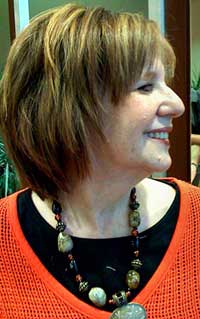Looking the part for life
What: “Not Just ‘A White Girl’s Thing:’ The Changing Face of Food and Body Image Problems”
When: 7 p.m. today
Where: MLK Jr. University Union Grand Ballroom
A reception will follow
Cost: Free
Dr. Susan Bordo has struggled with body image issues her whole life.
Bordo comes from a Jewish culture, which has a heritage of food as a source of love, sensuality and family – much like Black and Hispanic cultures, she said.
This was all fine and well when she was a child, until she left the house and was teased for being fat.
When Bordo was 13, she decided to completely remake herself to fit in.
Bordo went on an 800-calorie-a-day diet and succeeded in transforming herself – but it came at a price.
She become a chronic dieter and, from the ages of 18 to 36, a heavy smoker as well.
When she quit smoking, her battle with weight became more intense, even more so after she adopted a child.
Like many mothers, she said she began to use food to relax and comfort herself after a long day of taking care of others.
Bordo’s daughter is now nine, and she can see signs of body image troubles among children her age.
“So I’ve personally experienced all sides of the problem – as a fat kid, as a slim-but-obsessed teenager and young adult, as a mommy with a compulsive eating problem and spreading waistline, and as a concerned mother worried about her beautiful daughter and what this culture might do to her sense of self-esteem,” Bordo said.
Bordo intends to speak about these issues at 7 p.m. tonight in the Grand Ballroom of the Martin Luther King Jr. University Union. Her discussion, “Not Just ‘A White Girl’s Thing’: The Changing Face of Food and Body Image Problems,” was timed to come to Eastern during Women’s History Month.
Bordo is a professor of English and gender and women’s studies at the University of Kentucky.
Bordo grew up in Newark, N. J., during the fifties and early sixties.
She dropped out of college and worked at bookstores, designed record album covers and held other assorted jobs for several years. Eventually, she returned to college.
Bordo chose to major in philosophy, and she went on to get her Ph.D in the subject because she thought it was challenging.
But at heart, Bordo said she has always been a pop culture addict and a cultural critic.
“I’ve never been content just communicating with scholars and theorists,” Bordo said. “I like writing and speaking on topics that have to do with people’s everyday lives.”
Bordo is the author of several works on body image and issues, including “Unbearable Weight: Feminism, Western Culture and the Body,” her most well known book. She said it has been cited and discussed in scholarly writing and used in university courses.
Suzanne Enck-Wanzer, coordinator of women’s studies at Eastern, is well acquainted with Bordo’s work. She said she has often used and researched Bordo’s writing.
“I think she’s brilliant,” Enck-Wanzer said. She also said Bordo is provocative in her writing.
Enck-Wanzer said Bordo’s work engages social problems to make the world better.
The theme for Women’s History and Awareness Month this year is women’s bodies.
Enck-Wanzer, who saw Bordo speak at Indiana University five or six years ago, said Bordo was perfect to bring as a keynote speaker to go along with the theme.
Dr. Dagni Bredesen, an assistant professor of English and a member of the women’s studies minor faculty, said Bordo was an obvious choice because she has “thought a great deal and written extensively on the body in western thought and in contemporary culture.”
Bredesen said Eastern, like many university campuses, has students who battle eating disorders and have negative body image issues.
“When Dr. Bordo offered this as a topic for her plenary talk, we thought it would helpfully address a number of our campus community’s concerns,” Bredesen said.
Enck-Wanzer said one in ten college women will develop an eating disorder.
It is important to talk about where those issues come from and how to resist the media, she said.
Enck-Wanzer hopes students who attend the lecture learn to question where beauty standards come from.
In Bordo’s lecture, she will not just address issues of white women’s bodies, but also that of men and different races.
“When I first started writing and speaking about these issues, most people believed that only a handful of ‘spoiled’ white girls had food and body image problems,” Bordo said.
Bordo knew from her students and from tracking pop culture that this was not true.
She said in the last 10 years, the quest for the “right” kind of body has become a global phenomenon, crossing lines of race, class, nationality, sexuality and gender.
Bordo uses slides throughout her presentation to illustrate her points.
She said she will discuss the old “anorexic paradigm” and the groups that it left out and recommend more inclusive ways to conceptualize eating problems.
She shows how body image problems have shape-shifted to new addictions and obsessions: The problems are no longer just about anorexia, but reflect the changing and diverse nature of the beauty ideals today, she said.
People need to stop thinking just in terms of eating disorders because they are just one part of a widespread cultural obsession with body image and body makeover, Bordo said.
“If we’re going to continue to use the term ‘eating disorders,’ we better also include ‘cosmetic surgery disorders,’ ‘trying-to-look-like-a-digital-image disorders,’ ‘perky boob and booty disorders,’ ‘big muscle disorders,’ ‘tight buns disorders,’ and many others,” Bordo said.
Emily Zulz can be reached at 581-7942 or at eazulz@eiu.edu.
















![[Thumbnail Edition] Senior Foward Macy McGlone, getsw the ball and gets the point during the first half of the game aginst Western Illinois University,, Eastern Illinois University Lost to Western Illinois University Thursday March 6 20205, 78-75 EIU lost making it the end of their season](https://www.dailyeasternnews.com/wp-content/uploads/2025/03/WBB_OVC_03_O-1-e1743361637111-1200x614.jpg)






















































